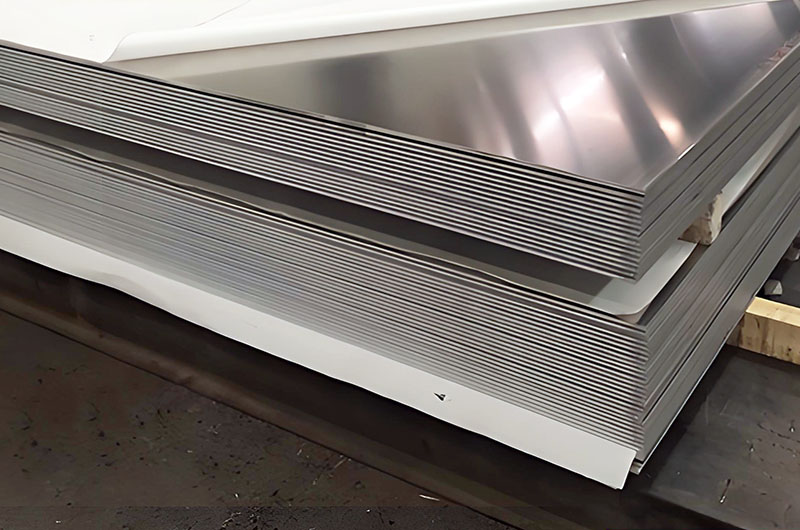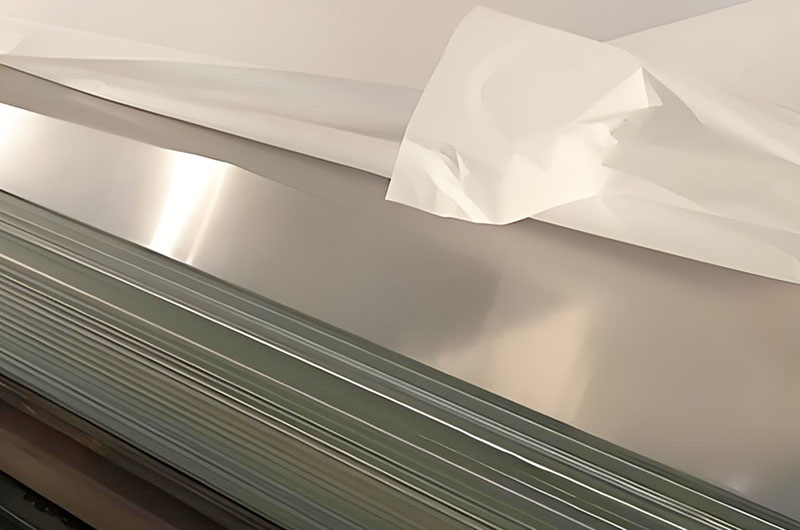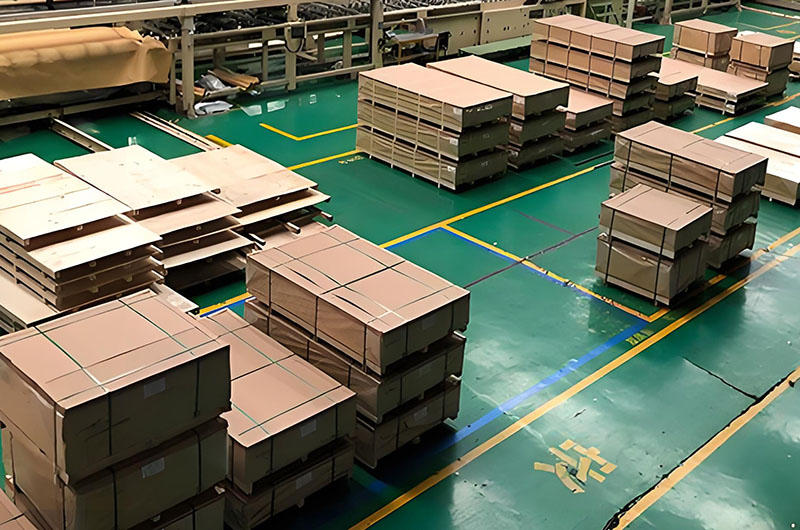

3005 aluminum alloy is a non-heat-treatable wrought alloy consisting primarily of aluminum and manganese, with manganese ranging from 1.0% to 1.5%. This composition improves its strength and corrosion resistance compared to 3003 alloy.
3005 aluminum sheet is an aluminum alloy with manganese as the primary alloying element, and a small amount of magnesium is added to its composition, making it stronger than the 3003 aluminum alloy. 3005 aluminum alloy is widely used in fields requiring good corrosion resistance, formability, and weldability, making it highly competitive in the market, especially in the field of rust-resistant aluminum plates.

Haomei Aluminum can provide 3005 aluminum alloy products in the form of: 3005 aluminum plate, 3005 aluminum coil, 3005 aluminum strip, 3005 aluminum rod, 3005 aluminum profile.

| Aluminum alloy | 3005 Aluminum sheet |
| Temper | O, H12, H14, H16, H18, H19, H22, H24, H26, H28, H112, etc. |
| Thickness (mm) | 0.1-500 |
| Width (mm) | 100-2650 |
| Length (mm) | 500-16000 |
| Application examples | Aluminum substrate for color coating, lamp housing and holder, Aluminum shutters, curtain wall, etc. |
UNS A93005, ISO AlMn1Mg0.5, Aluminium 3005, AA3005, Al3005
3005 aluminum plate, with its higher strength, excellent corrosion resistance, good formability, and weldability, is widely used in various fields, especially in air conditioning, refrigeration, construction, pressure vessels, heat sinks, etc. As a high-performance aluminum alloy material, it is suitable for industrial applications that require high strength, corrosion resistance, and good processing capabilities, and its moderate price makes it an ideal choice in many industrial sectors.
3005 aluminum plate has good corrosion resistance and is suitable for use in harsh environments.
3005 aluminum sheet has excellent formability and can be easily formed through various manufacturing processes, which is crucial for industries such as automotive, construction and packaging.
3005 aluminum plate has good weldability and is suitable for most welding techniques, including MIG and TIG welding.
The smooth surface of 3005 aluminum plates can be finished in a variety of ways, including anodizing, painting, and powder coating, to enhance their aesthetic appeal.
The main alloying element in 3005 aluminum plate is manganese, typically present at around 1.0-1.5%. In addition, magnesium (Mg) is added to the alloy, which gives it higher strength than the 3003 aluminum alloy.
| Chhemical Element | Content (%) |
| Aluminum, Al | 95.7 - 98.8 |
| Manganese, Mn | 1- 1.5 |
| Iron, Fe | ≤ 0.70 |
| Silicon, Si | ≤ 0.60 |
| Copper, Cu | ≤ 0.30 |
| Zinc, Zn | ≤ 0.25 |
| Magnesium, Mg | 0.20 - 0.60 |
| Chromium, Cr | ≤ 0.10 |
| Titanium, Ti | ≤ 0.10 |
| Other (each) | ≤ 0.050 |
| Other (total) | ≤ 0.15 |
| Alloy-Temper |
Tensile Strength (ksi) |
Yield Strength (ksi) |
Elongation (%) |
| 3005-O | 20 | 8 | 22 |
| 3005-H14 | 29 | 28 | 4 |
| 3005-H18 | 37 | 36 | 2 |
| Alloy / Temper | Specified Thickness Range | Ultimate | Yield | Elongation Percent Min. in 2 in. or 4D | ||
| Min. | Max. | Min. | Max. | |||
| 3005 / O | .006 - .007 | 17 | 24 | 6.5 | - | 10 |
| .008 - .012 | 17 | 24 | 6.5 | - | 12 | |
| .013 - .019 | 17 | 24 | 6.5 | - | 14 | |
| .020 - .031 | 17 | 24 | 6.5 | - | 16 | |
| .032 - .050 | 17 | 24 | 6.5 | - | 18 | |
| .050 - .249 | 17 | 24 | 6.5 | - | 20 | |
| 3005 / H12 | .017 - .019 | 20 | 27 | 17 | - | 1 |
| .020 - .050 | 20 | 27 | 17 | - | 2 | |
| .051 - .113 | 20 | 27 | 17 | - | 3 | |
| .114 - .161 | 20 | 27 | 17 | - | 4 | |
| .162 - .249 | 20 | 27 | 17 | - | 5 | |
| 3005 / H14 | .009 - .031 | 24 | 31 | 21 | - | 1 |
| .032 - .050 | 24 | 31 | 21 | - | 2 | |
| .051 - .113 | 24 | 31 | 21 | - | 3 | |
| .114 - .249 | 24 | 31 | 21 | - | 4 | |
| 3005 / H16 | .006 - .031 | 28 | 35 | 25 | - | 1 |
| .032 - .113 | 28 | 35 | 25 | - | 2 | |
| .114 - .162 | 28 | 35 | 25 | - | 3 | |
| 3005 / H18 | .006 - .031 | 32 | -- | 29 | - | 1 |
| .032 - .128 | 32 | -- | 29 | - | 2 | |
| 3005 / H19 | .006 - .012 | 34 | - | - | - | - |
| .013 - .063 | 34 | - | - | - | 1 | |
| 3005 / H25 | .006 - .019 | 26 | 34 | 22 | - | 1 |
| .020 - .031 | 26 | 34 | 22 | - | 2 | |
| .032 - .050 | 26 | 34 | 22 | - | 3 | |
| .051 - .080 | 26 | 34 | 22 | - | 4 | |
| 3005 / H26 | .006 - .019 | 28 | 36 | 24 | - | 1 |
| .020 - .031 | 28 | 36 | 24 | - | 2 | |
| .032 - .050 | 28 | 36 | 24 | - | 3 | |
| .051 - .080 | 28 | 36 | 24 | - | 4 | |
| 3005 / H27 | .006 - .019 | 29.5 | 37.5 | 26 | - | 1 |
| .020 - .031 | 29.5 | 37.5 | 26 | - | 2 | |
| .032 - .050 | 29.5 | 37.5 | 26 | - | 3 | |
| .051 - .080 | 29.5 | 37.5 | 26 | - | 4 | |
| 3005 / H28 | .006 - .019 | 31 | - | 27 | - | 1 |
| .020 - .031 | 31 | - | 27 | - | 2 | |
| .032 - .050 | 31 | - | 27 | - | 3 | |
| .051 - .080 | 31 | - | 27 | - | 4 | |
| Properties | Metric | Imperial |
| Thermal expansion co-efficient (@20-100°C/68-212°F) | 23.9 µm/m°C | 13.3 µin/in°F |
| Thermal conductivity | 160 W/mK | 1110 BTU in/hr.ft².°F |
3005 aluminum plate is used for processing parts that require good formability, high corrosion resistance, good weldability, or parts that require these properties and require strength higher than 1000 series aluminum alloys.
3005 aluminum plate is commonly used in humid environments such as air conditioners, refrigerators, and car bottoms. It is also commonly used in building materials and colored aluminum plates. 3005 aluminum plate has good formability, weldability, and corrosion resistance. It is used for processing parts and components that require good forming performance, high corrosion resistance and good weldability, or work that requires these properties and higher strength than 1000 series alloys, such as kitchen utensils, food and chemical product processing and storage equipment, tanks and cans for transporting liquid products, various pressure vessels and pipes processed with thin plates, general utensils, heat sinks, cosmetic panels, photocopier rollers, and ship materials.
3005 aluminum plates are often used in humid environments such as air conditioners, refrigerators, car bottoms, and oceans. They are also often used in general objects such as building materials, ship materials, colored aluminum plates, kitchen utensils, radiators, battery shells, and processing pipelines. They are also often used in building materials and colored aluminum.
The outstanding characteristics of 3005 aluminum plate make it widely used in various fields, particularly where corrosion resistance, durability, and good formability are required.
| Application | Description |
| Air Conditioning and Refrigerators | 3005 aluminum plate is widely used in the manufacture of air conditioner housings, refrigerator evaporators, and condensers, with good corrosion resistance, suitable for humid, low-temperature environments, and long-term use without corrosion. |
| Car Underbody | 3005 aluminum plate is commonly used in automobile chassis, body shells, etc., due to its high strength and good corrosion resistance, making it suitable for long-term use in the undercarriage. |
| Food and Beverage Packaging | 3005 aluminum plate is used in can lids and bodies, providing corrosion resistance to ensure the safety and integrity of food and beverages. |
| Electronics | 3005 aluminum plate is commonly used in electronic device enclosures, offering good conductivity, lightweight, and corrosion resistance, making it an ideal choice for electronic device housings. |
| Building Materials | 3005 aluminum plate is widely used in exterior wall decoration, roofing panels, window frames, etc., due to its strong weather resistance, good processing performance, and ability to withstand variable climate conditions while maintaining long-term beauty and durability. |
| Pressure Vessels and Pipelines | 3005 aluminum plate is widely used in the chemical, food processing, and liquid transportation industries, suitable for manufacturing liquid tanks, chemical containers, storage tanks, etc., with excellent corrosion resistance and formability. |
| Heat Sinks | 3005 aluminum plate, due to its excellent thermal conductivity and high strength, is commonly used in the production of heat dissipation components for electrical equipment and electronic products. |
| Shipbuilding Materials | 3005 aluminum plate has good resistance to seawater corrosion, making it widely used in ship hulls, bulkheads, and other areas, suitable for shipbuilding. |
| Kitchenware and Chemical Product Handling Devices | 3005 aluminum plate is widely used in kitchen utensils (such as cookware, baking trays, and pots) and chemical product handling and storage devices (such as chemical tanks and storage vats), offering high corrosion resistance and good formability. |

3003 and 3005 aluminum are both members of the 3000 series of aluminum alloys, known for their excellent corrosion resistance and good workability.
The primary difference between 3003 and 3005 aluminum lies in their mechanical properties and composition. 3005 aluminum has higher strength due to its increased manganese content, making it suitable for applications requiring more strength. Both alloys provide excellent corrosion resistance and good workability, but the choice between them depends on the specific strength requirements and application needs.
| Property | 3003 Aluminum | 3005 Aluminum |
| Corrosion Resistance | Excellent | Excellent |
| Workability | Good workability, easy to machine and weld | Good workability, slightly higher strength |
| Applications | Cooking utensils, storage tanks, heat exchangers, thin-walled components | Roofing sheets, wall panels, beverage cans |
Products you may be interested in
Further reading
Users viewing this material also viewed the following
Recommended Content
Please feel free to write down your requirement in the form below. We will reply you within 24 hours and we will protect your personal privacy information.